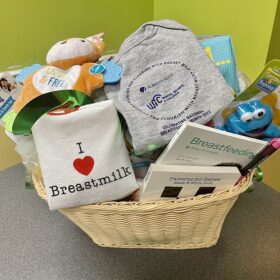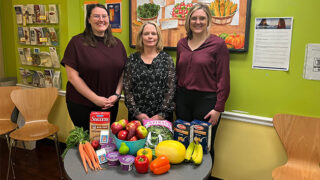WIC - Women, Infants & Children
What is WIC?
The Women, Infants, and Children (WIC) Program provides access to healthy foods for growth and development and promotes food nutrition through education.
WIC benefits for food are provided free of charge to pregnant, postpartum, or nursing women, and for infants and children under the age of 5 who demonstrate a need as determined by WIC guidelines.
The WIC office is open Monday through Friday, 8:30 a.m. to 4:30 p.m.
It's located at 220 Green St. Albany, NY 12202.
To speak with someone in the WIC office, call 518-432-4033.

WIC benefits make it easier for you to shop for healthy food, and can be used at participating grocery stores and farmers markets within New York State.
The WIC benefits cover foods including:
- Baby Food
- Brown Rice
- Canned Fish
- Cereal
- Cheese
- Dried or Canned Beans/Peas
- Eggs
- Fruit Juice
- Fruits and Vegetables
- Infant Formula
- Milk
- Peanut Butter
- Tofu
- Tortillas
- Whole Grain Bread
- Whole Wheat Pasta
- Yogurt
Due to the formula shortage, the NYS WIC formulary has alternate options for a limited time. Depending on the formula you receive, you may be able to temporarily purchase a combination of formula brands and alternate container sizes. If you can't find your assigned formula in the stores, the following resources are available:
See a list of WIC-approved baby formulas in New York State.
Learn more about foods and formula from New York State's WIC Vendors.
Please review the household size and income per pay periods to help determine if you're eligible for WIC benefits:
Effective June 2024 - June 2025
Pregnant individuals count as two people
One person household:
Annual: $27,861
Monthly: $2,322
Twice-monthly: $1,161
Bi-weekly: $1,072
Weekly: $536
Two person household:
Annual: $37,814
Monthly: $3,152
Twice-monthly: $1,576
Bi-weekly: $1,455
Weekly: $728
Three person household:
Annual: $47,767
Monthly: $3,981
Twice-monthly: $1,991
Bi-weekly: $1,838
Weekly: $919
Four person household:
Annual: $57,720
Monthly: $4,810
Twice-monthly: $2,405
Bi-weekly: $2,220
Weekly: $1,110
Five person household:
Annual: $67,673
Monthly: $5,640
Twice-monthly: $2,820
Bi-weekly: $2,603
Weekly: $1,302
Six person household:
Annual: $77,626
Monthly: $6,469
Twice-monthly: $3,235
Bi-weekly: $2,986
Weekly: $1,493
Seven person household:
Annual: $87,579
Monthly: $7,299
Twice-monthly: $3,650
Bi-weekly: $3,369
Weekly: $1,685
Eight person household:
Annual: $97,532
Monthly: $8,128
Twice-monthly: $4,064
Bi-weekly: $3,752
Weekly: $1,876
For each additional person:
Annual: +$9,953
Monthly: +$830
Twice-monthly: +$415
Bi-weekly: +$383
Weekly: +$192
To find out if you are eligible for WIC and to begin enrollment, please call the WIC office at 518-432-4033.
Appointments can be done virtually or in person.
Lactation Destination Club
We offer breastfeeding discussion groups for anyone thinking about or planning to breastfeed. Bring your partner, family, or friends - anyone in your support system! It's free to attend!
Share questions and learn facts about breastfeeding and all of its great benefits.
Discussion topics include:
- Is breastfeeding for me?
- Breastfeeding when pregnant
- Breastfeeding in the hospital
- Postpartum breastfeeding
- How long should I breastfeed?
- Breastfeeding at work/school
- Breastfeeding and relationships
Signing up for a group is simple! Ask a WIC staff member at your next appointment, or call the office at 518-432-4033.
Upcoming Dates (In-person only)
- Friday April 18, 2025 at 12:30 - 1:30 p.m.
- Friday May 16, 2025 at 12:30 - 1:30 p.m.
- Friday June 13, 2025 at 12:30 - 1:30 p.m.
- Friday July 11, 2025 at 12:30 - 1:30 p.m.
*Future dates to be determined
In accordance with federal civil rights law and U.S. Department of Agriculture (USDA) civil rights regulations and policies, this institution is prohibited from discriminating on the basis of race, color, national origin, sex (including gender identity and sexual orientation), disability, age, or reprisal or retaliation for prior civil rights activity.
Program information may be made available in languages other than English. Persons with disabilities who require alternative means of communication to obtain program information (e.g., Braille, large print, audiotape, American Sign Language), should contact the responsible state or local agency that administers the program or USDA’s TARGET Center at 202-720-2600 (voice and TTY) or contact USDA through the Federal Relay Service at 800)-877-8339.
To file a program discrimination complaint, a Complainant should complete a Form AD-3027, USDA Program Discrimination Complaint Form which can be obtained online at: https://www.usda.gov/sites/default/files/documents/USDA-OASCR%20P-Complaint-Form-0508-0002-
508-11-28-17Fax2Mail.pdf, from any USDA office, by calling 866-632-9992, or by writing a letter addressed to USDA. The letter must contain the complainant’s name, address, telephone number, and a written description of the alleged discriminatory action in sufficient detail to inform the Assistant Secretary for Civil Rights (ASCR) about the nature and date of an alleged civil rights violation. The completed AD[1]3027 form or letter must be submitted to USDA by:
mail: U.S. Department of Agriculture Office of the Assistant Secretary for Civil Rights 1400 Independence Avenue, SW Washington, D.C. 20250-9410; or
fax: 833-256-1665 or 202-690-7442; or
email: program.intake@usda.gov
This institution is an equal opportunity provider.
For other complaints or to request a Fair Hearing contact:
Mail: WIC Program Director NYSDOH, Riverview Center 150 Broadway, 6th Floor, Albany, N.Y., 12204
Phone: 518-402-7093;
Fax: 518-402-7348; or email: NYSWIC@HEALTH.NY.GOV
